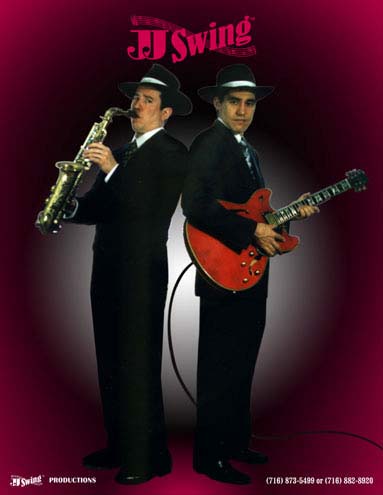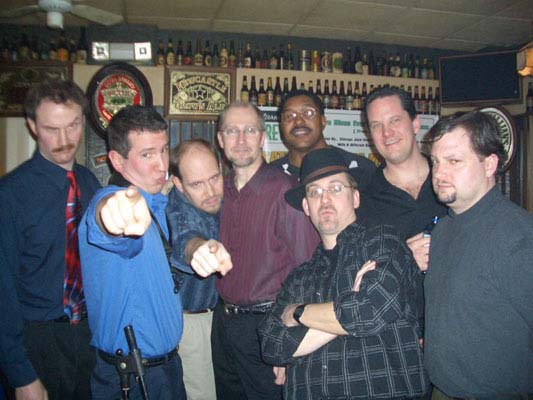Coming Up
| No events |
JJ Swing History
The history of

The year was 1999. Swing bands such as “Big Bad Voodoo Daddy,” “Cherry Poppin’ Daddies,” and various other “Daddy” bands were leading a short-lived resurgence in swing music throughout the country. Meanwhile, here in Buffalo an eight-piece band was forming that would take the Buffalo music scene by storm. JJ Swing was born.
It began in the back of a bus. Jim Runfola, while touring with the Tommy Dorsey Orchestra, began writing horn charts from groups such as Blood, Sweat & Tears, The Blues Brothers, and Chicago with the help of a Casio keyboard and a Walkman. He knew these tunes would form the basis for a great horn band. Charts in hand, he now had to find the right guys to pull it off. His first choice for a front man was Joe Mahfoud. Jim had worked with Joe previously and knew his voice and guitar were the right combination to make the project fly.
 |
| First promotional picture of Jim Runfola and Joe Mahfoud for JJ Swing, circa 1999. |
Joe brought in bass player Jerry Sampson and drummer Scott Colandra to form the rhythm section. Jim went about finding horn players. Jim played alto sax, Harry Fackelman and Al Monte were brought in on baritone and tenor to fill out the sax section. While many fine players were brought in to fill the trumpet and trombone parts, the right mix was elusive. Finally in late July, Rick Keller was brought in on trumpet and Jeff Marsha on trombone and the band was complete.
Originally, the band specialized in the swing styles made popular by national acts. JJ Swing was formed around a powerful five-piece horn section backed by a tight three-piece rhythm section. On stage, they performed wearing suits and lids in the style of the swing era.
JJ Swing played a variety of venues that first year, including the Taste of Buffalo and Erie County Fair, as well as local bars. The concept at the time was that it would be a summer event group, so when September came, the band broke for the season. The final mix of band members that summer were: Joe Mahfoud (guitar and lead vocals), Scott Colandra (drums), Jerry Sampson (bass), Rick Keller (trumpet), Jeff Marsha (trombone), Jim Runfola (alto sax), Harry Fackelman (bari sax), and Al Monte (tenor sax).
The group came back the following year. Scott Colandra had left the band and Jim Linsner took over the drumming duties. Al Monte left the group as well. He was not replaced, and JJ Swing was now a seven-piece group.
The band again found success in local events, playing for the AAA Centennial celebration, the Taste of Buffalo, the Erie County Fair, as well as traveling to Foxwoods Casino in Connecticut. As the summer of 2000 drew to a close, the group decided to continue through the fall and winter rather than wait until the following summer to play again.
Over the next couple of years, JJ Swing evolved away from the swing genre. They added material from a number of diverse artists such as Stevie Ray Vaughn, Van Morrison, and Chicago. Nationally, the swing movement was in decline, but JJ Swing’s diversity allowed them to remain viable. The band moved away from the swing style visually as well, adopting a “snappy casual” dress style on stage.
In the summer of 2002, JJ Swing added keyboards to the group as Pat Georger joined the band. This allowed them to add even more
diverse material, and Jim Runfola arrangements of songs by Steely Dan and Earth, Wind, & Fire were added to their repertoire.
In fall of ’02, after and winning the local competition sponsored by the Blues Society of WNY, the group performed in The International Blues Festival on Beale St. in Memphis, TN for two nights in January 2003, followed by an illustrious appearance at the famous Atpart Theater in Lewiston, NY.
 |
| JJ Swing performs onstage in "Swing" at Artpark in August 2003. |
Not long after that, Joe Mahfoud announced his intention to leave the group by the end of the year. The search was on for a new voice to lead the group into the future. The search for a new lead vocal/guitar was extensive. The band sifted through hundreds of audition tapes, and were personally accosted by hopefuls in shopping malls, restaurants, drive thru’s, massage parlors, Betty Ford clinics, on beaches, etc.
Finally, one night Jim Linsner reached out to local guitarist Joe Mombrea, a long-time fan of Jim's former band, The Need. Joe excitedly prepared and came as a perfect stranger to the rest of the group, nervous as a sinner in church. After the first song, a spirited rendition of Stevie Wonder's "Superstition,' there was a stunned silence, broke by Jeff Marsha, who matter-of-factly intoned, "Well, looks like we found our new singer." The search was over. The band had their newest, bestest buddy and lead singer.
 |
|
First promotional picture of Joe Mombrea for JJ Swing, taken backstage at Rockwell Hall (Buffalo State College) |
In addition to the existence of countless bootleg recordings and YouTube videos of various performances, JJ Swing has released two official albums. “Make Me Smile” was released on CD in 2005, and "Tribute," their sophomore effort, in 2016. The latter passed Aluminum status in the first week; to date, it has earned the band thousands of cents as sales have reached the tungsten level.
Since then, JJ Swing has undergone many lineup changes while maintaining its status as one of the hardest-working, hardest-rocking bands in western New York. Jeff Marsha has been supplanted by the great Pim Liebman on trombone. Jim Wynne stepped in for Pat Georger when he left for greener pastures. And most recently, California guitarist extraordinaire Dave Hill has joined forces with the group on guitar and vocals. We lost our dear friend Harry Fackelman in 2024--one of the most famous and talented horn players and educators in Buffalo history, and co-founder of the Amherst Saxophone Quartet. In his very large shoes now stands the wonderfully gifted and charismatic Aaron Broome, often joined onstage by his equally cool brother and former brass-hole, Jason.
One of the secrets to the ability of a nine piece band to maintain such a busy schedule lies in the availability of highly talented substitutes to take the place of a regular member when schedules conflict. JJ Swing owes no small measure of thanks to those who have filled in for missing members of the band.
What happens next? Stay tuned for the next chapter in JJ history…….
